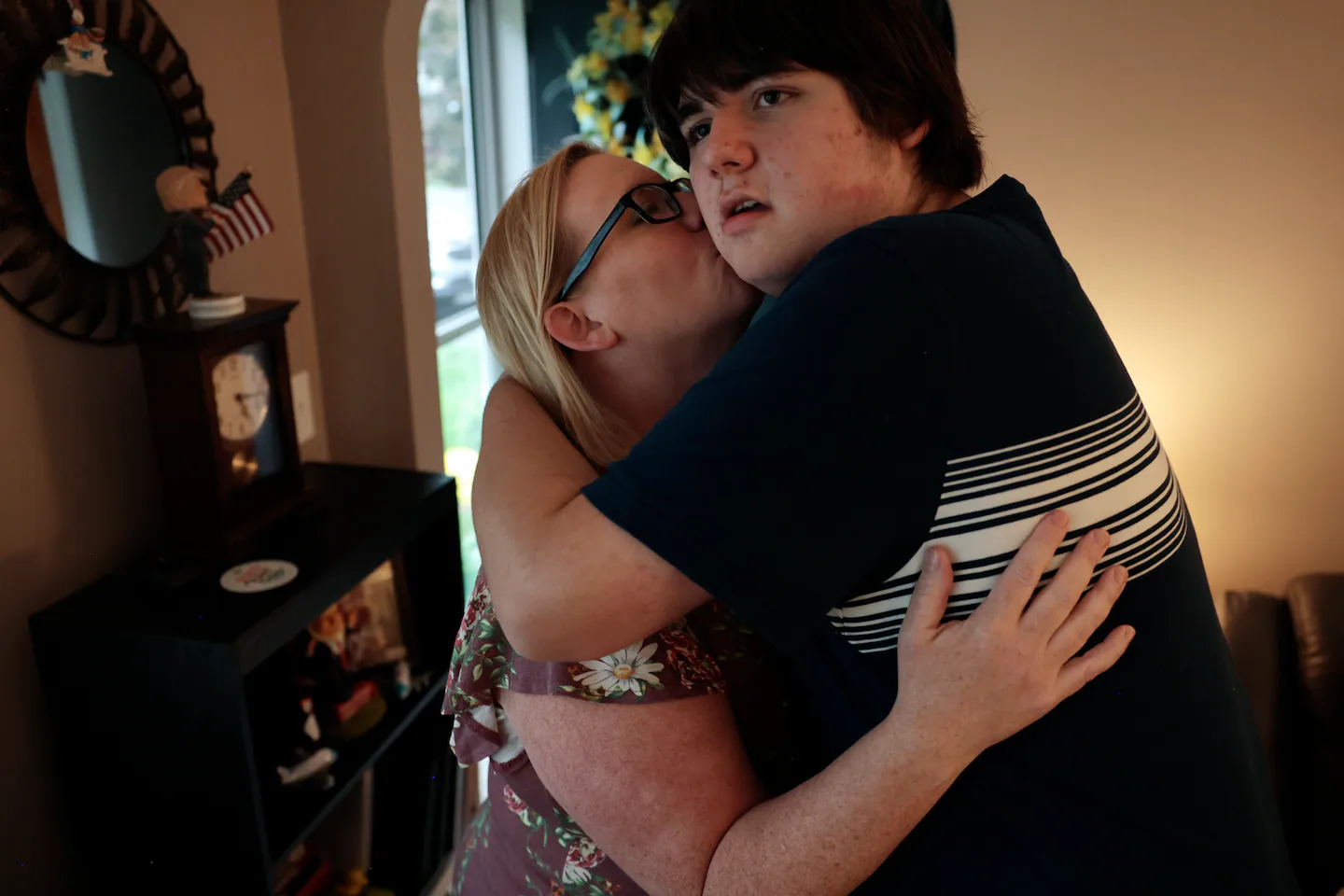
“She used to be very quiet, but lately, it’s like she’s figuring out her voice and won’t stop yelling,” Mena said on the phone as Willnelys could be heard babbling excitedly in the background.
Hers is the kind of story the Trump administration had in mind on Monday when it declared leucovorin, a form of folic acid or vitamin B, as the first federally sanctioned treatment for children with autism. The Food and Drug Administration relabeled leucovorin, previously used primarily to counteract the toxic effects of cancer treatments, to treat folate deficiency in the brain, a condition associated with autism. Folate plays a critical role in the body’s production of DNA and red blood cells and is essential for development of the brain and nervous system.
The relabeling will make leucovorin available to a larger number of people on the autism spectrum, and it’s already set off a scramble among parents eager for any treatment that could help their children communicate.
The announcement comes amid a larger campaign by the Trump administration, particularly Health secretary Robert F. Kennedy Jr., to question the safety of some vaccines and link them and common medications such as Tylenol to rising autism rates. Many public health specialists say such claims have long been debunked, but are fueling confusion and distrust of widely-proven medicines among the public.
While clinical trials of leucovorin have shown promising results, they all have been small in scale, and specialists say there isn’t enough solid information to help doctors determine how effective it is, which patients should get it and, importantly, in what dosage.
“Changing a label for folate deficiency is very different than saying we have a treatment for autism,” said Jared Schwartzer, a researcher at Mount Holyoke College who has spent the past decade studying the complex relationship between pregnancy, the environment, and autism.
While leucovorin may improve outcomes for some children with folate deficiencies, Schwartzer fears that marketing the drug more broadly risks misleading families and will fuel mistrust in science while ignoring any potential side effects. And parents of nonverbal or low-verbal children are often most vulnerable to these promises, Schwartzer said.
“They just want what’s best for their child, but we need targeted medicine that’s grounded in strong evidence, not a one-size-fits-all solution.”
Melissa Machado, a kindergarten teacher from North Attleboro, watched the leucovorin announcement on Monday by President Trump with concern. She worries that, one the one hand, there will now be a shortage of the drug, and on the other, its association with the Trump administration could end up sowing doubt about its effectiveness.
After just six weeks on the medication, her 19-year-old son, Connor Maloney, is speaking more frequently, reducing repetitive behaviors, and interacting more with his family.
“I couldn’t be happier,” she said. “If this gets him on the pathway to speech or helps with his understanding, it’s worth every chance of trying it.”
Nonetheless, Machado said she is “also concerned about the stigma around this being tied to an administration that is often controversial. It’s frustrating that something that’s helping so many people might be misunderstood.”
What little is known about leucovorin and autism mostly comes from a series of small trials conducted by Dr. Richard Frye, a Phoenix-based child neurologist formerly affiliated with the University of Arizona College of Medicine.
In a study published in 2018, Frye enrolled 48 children with autism spectrum disorder in a trial and gave around half of them leucovorin and half a placebo. Those receiving the supplement showed significantly greater improvement in verbal communication, he and his team reported in the journal Molecular Psychiatry. Frye now has two active clinical trials for leucovorin use in children with autism.
In an interview, he said that roughly 10 to 15 percent of his participants who take leucovorin show a dramatic improvement and another 40 percent experience a “good response.”
Another study, conducted by researchers in India on 40 children ages 2 to 10 years old, found no adverse reactions and concluded leucovorin was “effective and safe in improving ASD symptoms.”
Frye said children who receive leucovorin as young as age 2 and a half show more improvement than those who start later. He stressed, though, that not all children respond.
“We have kids who have completely normalized,” he said. “It’s not every case or even most cases, but some kids have a dramatic response to it. Sometimes, there’s some hyperactivity when you start it, but for the most part, it’s safe.”
Fyre said he is now starting a drug company and is in discussions with the FDA to create a leucovorin formulation specifically for children with autism. He is also promoting a book on leucovorin.
The importance of folate in early brain development is well established. Researchers have long advised women to take folic acid supplements even before pregnancy, as deficiencies increase the risk of neurodevelopmental disorders in their children.
But, some doctors are treading cautiously with leucovorin. The medicine “isn’t for everybody,” said Dr. Timothy Buie, co-director of the GI-Autism Clinic at Boston Children’s Hospital. The only known negative side effects are hyperactivity and aggression.
“These vitamins or other therapies are not without side effects,” he said, including some physicians aren’t aware of because it hasn’t been studied on larger populations.
Dr. Erik von Hahn, Chief of Developmental-Behavioral Pediatrics at Tufts Medical Center, said his department does not recommend leucovorin because of a lack of evidence, but nonetheless will prescribe it to families who insist on trying it.
“We need well-designed studies to know what dose to use, under what circumstances, and whether it truly works,” he said. “Given the national attention, more rigorous research will come.”
A child would have to undergo testing to determine if he or she should be diagnosed with a cerebral folate deficiency. The test can involve blood draws and, in some cases, a puncture of the lumbar to measure folate levels in the cerebrospinal fluid. Frye said people on the spectrum with folate deficiency have a broken mechanism for transporting folate into the brain. Leucovorin can bypass this faulty mechanism, helping restore folate levels in the brain, which can improve verbal communication.
Many parents told the Globe they have been able to get leucovorin without getting their children tested.
MassHealth, the state’s Medicaid program, covers leucovorin with prior authorization. Last year there were 1,470 claims, although it’s unclear how many were prescribed for cancer an how many for folate deficiency.
Keith Joyce, 60, of Inver Grove Heights, a suburb of St. Paul, Minn., started a Leucovorin for Autism Facebook support group two months ago that now has more than 44,000 members — half of whom joined this week. Joyce, the primary caregiver for his toddler grandson with autism, said he first learned of Frye’s research on leucovorin in December and spent months pressing neurologists and behavioral specialists about the off-label treatment.
In April, his 4-year-old grandson, Jose, started on leucovorin without any prior tests. He’s on 30 milligrams a day, slightly lower than the doses indicated in Frye’s studies.
“No one knew about it because we are not treating autism directly,” he said, noting his grandson’s severe speech delays and other co-occurring conditions. “Doing a spinal tap on a four-year-old? Hell no. Insurance wouldn’t cover the blood test, and I’m not the richest person.”
A behavioral pediatrician ultimately prescribed the drug without testing. Now Jose is talking in full sentences, Joyce said, and his awareness of the world has expanded. “We watch soccer games together. By late May, he was fully paying attention. I’m just very happy we’re one of the lucky ones,” he said.
Schwartzer, the Mount Holyoke neuroscientist, cautions that some studies reported a “large placebo effect” among patients, so that changes some parents believe are happening may not be due to the medicine.
“At least part of the benefit may be due to placebo, which is not unusual in clinical studies but is important to acknowledge,” he said.
Michelle Lamattina of Derry, New Hampshire, was skeptical when she first heard about Frye’s research, but became intrigued after reading news reports. When she asked her doctor’s office this week, she said physicians were hesitant to prescribe the treatment, citing a lack of dosing guidelines.
Lamattina’s 7-year-old Benjamin is nonverbal and attends multiple behavioral therapies.
“If my son could just say ‘I love you,’ that would be worth it for me,” said Lamattina, 43. “Honestly, I’m willing to do whatever it takes.”



